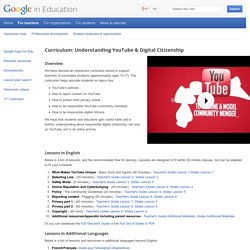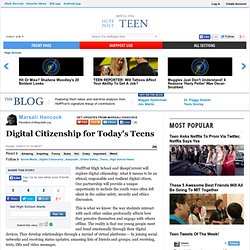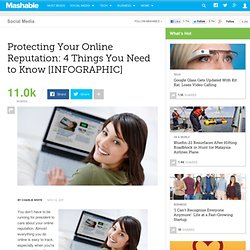

Curriculum: Understanding YouTube & Digital Citizenship – Google in Education. Overview We have devised an interactive curriculum aimed to support teachers of secondary students (approximately ages 13-17).

The curriculum helps educate students on topics like: YouTube’s policies How to report content on YouTube How to protect their privacy online How to be responsible YouTube community members How to be responsible digital citizens We hope that students and educators gain useful skills and a holistic understanding about responsible digital citizenship, not only on YouTube, but in all online activity. Lessons in English Below is a list of lessons, and the recommended flow for delivery. Or you can download the Full Teacher's Guide or the Full Set of Slides in PDF. Lessons in Additional Languages Below is a list of lessons and resources in additional languages beyond English: Learn more To learn more visit the Classroom videos page of this website, where you can find links to information on:
Cffdigitalcitizenship - Resources for Digital Citizenship. Bad Online Behavior Jeopardizes Students' College Plans. Once Posted You Lose it. The Think Before You Post campaign. SonicWALL - Web Site Blocked. Be Cyber Safe - Cyberproofing 101 - Internet Safety for Parents and Children. Online safety & civility. OnGuard Online.
Family Safety Center. A Parents' Guide to Facebook. iKeepCurrent. Marsali Hancock: Digital Citizenship for Today's Teens. HuffPost High School and iKeepCurrent will explore digital citizenship: what it means to be an ethical, responsible and resilient digital citizen.

Our partnership will provide a unique opportunity to include the youth voice often left silent in the online safety, security and ethics discussion. This is what we know: the way students interact with each other online profoundly affects how they perceive themselves and engage with others offline. The reality is that our young people meet and bond emotionally through their digital devices. They develop relationships through a myriad of virtual platforms -- by joining social networks and receiving status updates; amassing lists of friends and groups; and receiving, texts, IMs and video messages.
Every day we learn of digital dramas and dilemmas that are rocking schools, regions or the entire nation. That's why we've created the iKeepCurrent Generation Safe News Feed. The New 3 Rs. Blogs - DAILY INSIGHT: 15 digital citizenship resources for schools. Protecting Your Online Reputation: 4 Things You Need to Know. You don't have to be running for president to care about your online reputation.

Almost everything you do online is easy to track, especially when you're using social media sites. This infographic shows you how to manage your "e-reputation," perhaps saving you some embarrassment, or even your career. Gathered by digital marketing firm KBSD, it's a treasure trove of tips, techniques and information about what companies and individuals are looking for inside your personal profiles and social information, and what you can do to show off your best side to those who might want to find out unflattering things about you.
It's not too late to protect yourself and polish up your online image. So now that you've grown up (you have grown up, haven't you?) Infographic courtesy KBSD, photo courtesy iStockphoto/Yuri Arcurs. Lhotastuff - Digital Citizenship and Safety Resources for Schools.